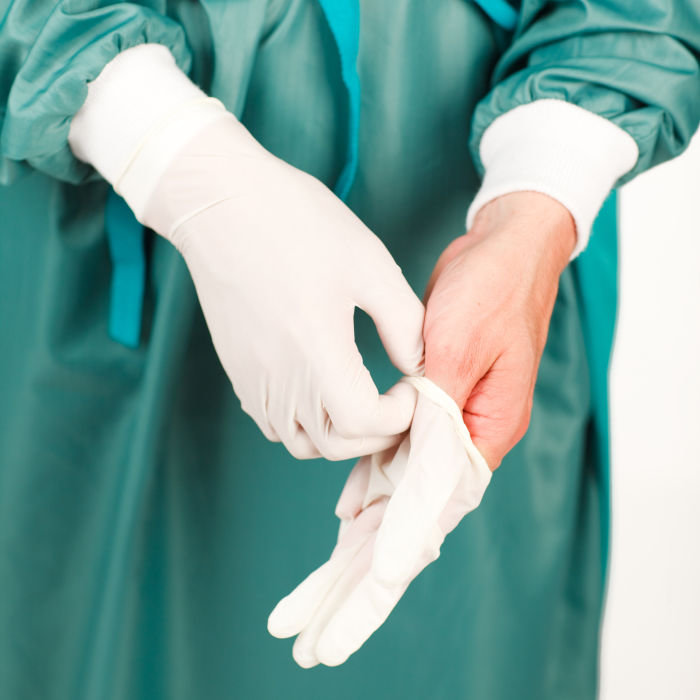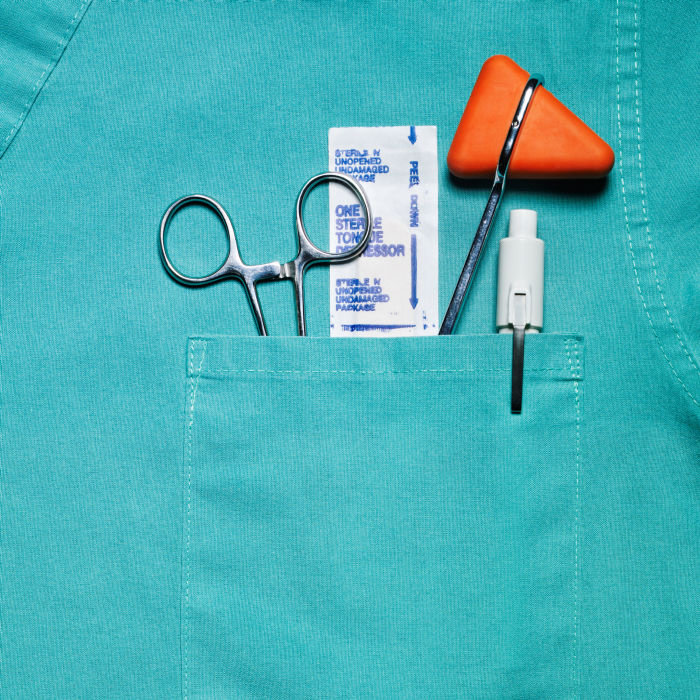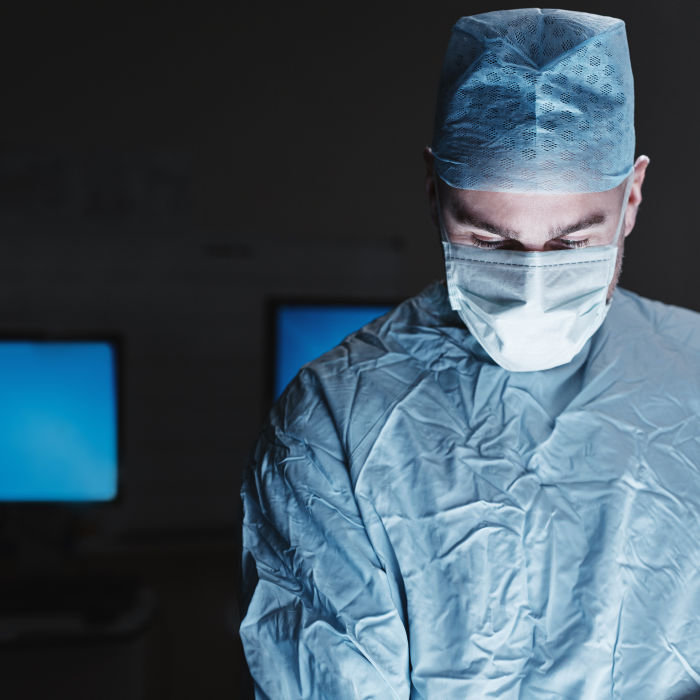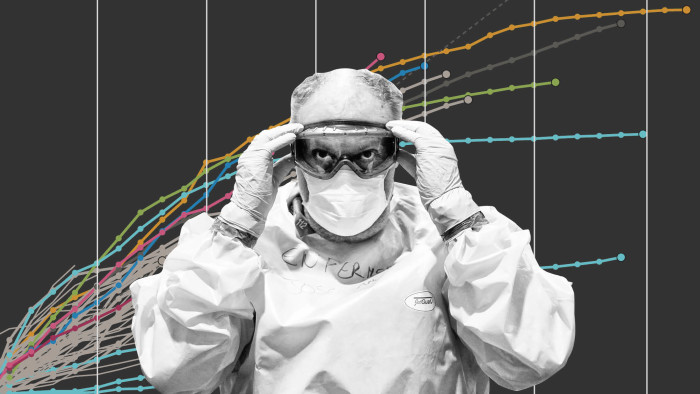Surgeon Henry Marsh: Covid-19 and the doctor’s dilemma | Free to read
Simply sign up to the Life & Arts myFT Digest -- delivered directly to your inbox.

The realisation that Covid-19 was going to be a very serious problem came to me shortly after my 70th birthday two weeks ago. I had celebrated this in a small and happy party with my family and friends — in retrospect, some of them almost certainly were already infected with the virus. We joked about not shaking hands or embracing. I didn’t appreciate it at the time, but the party was not just celebrating my birthday but also marking my entry into a higher-risk group for dying from the virus.
There is nothing new about pandemics, nor is there anything new about our short memories — especially for painful events, both in our own lives and in society as a whole. Time heals all wounds, as they say, but it makes us vulnerable as well. Most of us also suffer from an innate biological optimism that has us believe bad things happen to other people but not to us. Problems arise, however, when those in power suffer from the same weakness.
After initial denial, China swung into action very quickly, informed by memories of the recent, more deadly but less transmissible Sars coronavirus. But in the west, most of us — myself included, and certainly our politicians (whose minds were elsewhere) and NHS leaders — comforted ourselves with the thought that what happened in China was far away and of little relevance to us, and anyway it was only a disease of old people who were going to die soon anyway. Don’t panic! Keep Calm and Carry On! (And don’t spend large sums of money on protective clothing for health workers.) How wrong we were.

Each pandemic, the experts tell us, is different. What is striking about Covid-19 is that it is mainly, but not entirely a serious threat to the elderly and infirm — “patients with co-morbidities” in the jargon. For unknown reasons, a significant number of middle-aged patients are at serious risk as well. It is also clear that many people can be asymptomatic and infected and hence infectious without knowing it — which makes controlling the disease particularly difficult.
In susceptible people, the virus causes pneumonia after the first few days (when the symptoms can initially be hard to distinguish from a common cold or flu). In the past there was no treatment for viral pneumonia, other than oxygen. You either lived or died. Now we can save some of these lives with mechanical ventilators, which force oxygen into the failing lungs. But even with ventilation, there will still be many deaths.
The problem is an ancient one — Covid-19 is the latest pandemic in a long line of them. There are many examples of pandemics that drastically changed the course of history. But this one is also peculiarly modern. There are far more elderly people in today’s world.
Furthermore, there were no ventilators in the past. Now there will almost certainly be large numbers of patients who need ventilation, even though the mortality of the virus is probably only in the region of 1 per cent. (This figure is very uncertain, as we simply do not know how many asymptomatic cases there may be in the population or how many patients currently in hospital will go on to die.)
But even at 1 per cent we are looking at many thousands of people — perhaps millions worldwide — who will die without artificial ventilation, and by no means will all of them be old or unfit. Besides, don’t the old and unfit deserve treatment as well? There could be more than enough patients to lead to the collapse of the healthcare system, as in most countries — and especially in the cash-strapped NHS, starved by the recent years of austerity politics — ventilators, and the highly trained staff needed to run them, are in short supply.
Social interaction determines the rate at which a respiratory virus pandemic spreads. The virus thrives on the fact we are such sociable creatures. It jumps from person to person — by touch, by affection, by droplets in the air, by hard surfaces we have touched. So the politicians and their expert advisers face a terrible choice.
How do you balance drastically curtailing social interaction, with the risk of crashing the economy, to save the baby boomers, healthcare workers and some younger people, against the next generation’s future? Remember, for instance, that almost every child on the planet is now being deprived of schooling. If the health service collapses, it will not just be people with the virus who die but many with other life-threatening conditions, who cannot access the treatment they would normally have received before the catastrophe.


Politicians talk of “waging war” on the virus. War involves sacrifice. Do we sacrifice the elderly now, for younger patients who have more years of life ahead of them? And when do we start economic activity again for the sake of future generations? Decisions about who should live and who should die at the height of the crisis will simply be forced upon the poor doctors caring for the patients — the one that George Bernard Shaw, in a very different context, addressed many years ago in his play The Doctor’s Dilemma.
As cases multiply, it should also become possible to make more accurate predictions as to who can realistically be saved with intensive care. Sir David King, the government’s former chief scientific adviser, is entirely right to say that people in their nineties with respiratory failure from Covid-19 should consider not going in to hospital. He is already being criticised for saying this — but this is a war. Sacrifices must be made.
We will have little choice other than to apply a cruel and horrible utilitarian calculus, in flagrant breach of the ideal of the sanctity of life. How much longer does this patient have to live anyway? Do they have any dependants? The fact that they are loved is not sufficient grounds by itself to treat them. As doctors we have always had to make these assessments, but usually discretely — you cannot legislate for them. My colleagues will now just have to make a grotesquely larger number of such decisions than usual. I do not envy them. And, alas, there will also be an element of arbitrary “first come, first served”.
There has already been a huge shift of wealth from the young to the elderly over recent decades in wealthier countries. Donald Trump is already talking complacently about getting the US economy going again by Easter and yet in recent years the benefits of any growth in the US and UK economies have accrued to a very small number of people. If social distancing is relaxed, cui bono? It is utterly extraordinary how Covid-19 has raised the most profound questions about every aspect of our lives — decisions in a time of war are easy in comparison. My own opinion is that any prolonged social distancing, when it ends, must come with a massive redistribution of wealth in our societies, towards the young and disadvantaged.
Compared to most wealthy OECD countries, Britain’s tax-funded health service has almost always suffered from a lack of resources, arising from politicians’ fear of losing elections by raising taxes. Under recent governments, there has been a charade that “efficient management” would somehow make up for this under-investment. My last few years in the NHS convinced me that the main effect of this has been to demoralise the workforce and reduce productivity, especially that of the senior doctors.
The Covid-19 crisis has exposed, quite horribly, the inadequate state of the NHS, at the cost of the lives of not just patients, but also of doctors and nurses. Although we are only at the beginning of the pandemic, two NHS consultants and one nurse are already on ventilators in intensive care units (10 per cent of the patients hospitalised in Lombardy with Covid-19 are healthcare workers).


I can only hope that some good may come of this tragedy. I believe passionately in the principle of the NHS — we will soon see how the fragmented, hugely expensive and largely commercial US healthcare system copes with the crisis. I would love to think that the political neglect of the NHS will become a thing of the past, albeit at the price of higher taxes.
Thinking of my own initial insouciance about the virus when it emerged in China, I cannot very well blame western governments for at first running away from making difficult decisions. But it was clear by early February that the risk of the disease spreading was very great and that it was the draconian measures imposed in China which were starting to contain it. Italy had to learn this painful lesson all over again.
It is always easy to be wise in retrospect, but the unpreparedness of the NHS, in terms of PPE (personal protective equipment), proper hygiene rules, especially in hospitals, and virus testing kits will need to be thoroughly investigated at a later date. There will be a demand for people to be held to account, but for now the government must concentrate on playing a game of catch-up. As for the US, and Trump’s initial dismissal of the virus, comparing it with flu, when it was perfectly clear that it was many times more deadly (as well as his support for the anti-vax movement in the past) — I am lost for words.
I finally retired from the NHS last year, but a few days ago started contacting my former colleagues to find out what was happening. Several of them were already off sick with the virus. My colleagues spoke of complete chaos in their hospitals — with a lack of PPE and no proper guidelines for hygiene. (In China, the elevators have disposable toothpicks with which to press the elevator buttons — the virus can survive for many days on hard surfaces.) The lack of widespread testing means that they have no way of knowing whether patients admitted with problems other than viral pneumonia are infectious or not. The hospitals have therefore become incubators of the virus, which is why so many healthcare workers are contracting it and probably many patients who have been sent home from the hospital as well. My colleagues spoke bitterly of feeling like cannon fodder, of being sacrificed. Only now, as we wait for the exponential phase of the disease to hit us — the nightmare — are these problems starting to be corrected.


My wife Kate is 12 years younger than I am, but on immunosuppressant drugs for a chronic disease, and she is therefore in a high-risk category. She has almost certainly contracted Covid-19 — perhaps at my birthday party — and at the moment is in the early stages. By the time you read this article it will probably have become clear what will happen — whether she develops life-threatening pneumonia or not.
Doctors are usually both fatalistic and anxious about their family’s health. We know that bad things happen — we witness this at work every day — but also that bad things are, on the whole, unusual. Until you reach old age, that is. When members of our family fall ill, we have to wrestle with professional realism and anxiety driven by too much knowledge. I have little choice other than to think of the worst that might happen, work through my feelings about it, and then try to put it to one side. I suppose you could call this “catastrophising” but, I’m afraid to say, Covid-19 is a catastrophe, even though almost all of us, strange to say, will survive it.
The panic-buying is a reaction to this feeling of incipient catastrophe. A few mornings ago, I visited the local shops. Although I had enough food in the house to last me for a few days, I had to struggle to overcome an almost irresistible urge to buy something, to buy anything, to reassert control over a frightening future. And yet the virus is no real threat to food or loo paper (the latter I am perfectly happy to do without and have a shower instead).
Editor’s note

The Financial Times is making key coronavirus coverage free to read to help everyone stay informed.
Having assuaged my urge to buy by acquiring a bag of potatoes, I wandered around the various supermarkets in my neighbourhood, out of anthropological interest. The upmarket one was clean out of gin and tonic — clearly the gin-drinking classes had descended Wimbledon Hill like locusts. Nowhere was loo paper to be found, and in recent days even the perishable fruit and veg — absurdly — have been swept off the shelves.
We are, of course, hunter-gatherers by nature, who lived from hand to mouth, but now we are equipped with freezers and fridges, and have morphed into hoarding panic shoppers. The supermarkets have started dedicated shopping hours for the elderly — but I saw a long queue of them, tightly bunched, waiting for my local supermarket to open, presumably blissfully ignorant of the risk they were taking. All this needs to change.
Apparently the same happened at first in Italy. Like a speculative bubble, panic-buying is only made necessary by panic-buying. But after a while people realised it was not necessary. And also that there were more serious things than loo paper to worry about — such as the death of people you loved.
It is an immaculate spring day outside. There was a fine dawn chorus from the garden birds this morning, and the flowering bushes are starting to blossom. Despite the cold east wind, my bees have emerged from their hive and are shooting upwards in zigzags through the sunlight. Although it is a weekday, I can hear my neighbours’ children happily playing in their garden. Separation from my grandchildren is one of the many painful consequences of Covid-19.
I am lucky to have a garden and a workshop — there is plenty to keep me occupied. I am lucky to have a pension and not to be part of the gig economy, or in the aviation, entertainment or hospitality industries. The small local park next to my home remains open and I can still run three miles every day in rather boring circles. I like to think that keeping fit will help me fight the virus if I contract it, but in fact there is no evidence that this is the case. Some perfectly fit people are dying from the disease.
It was disturbing to see how many people were not obeying the two-metre-apart rule last weekend. At the beginning of the crisis, Boris Johnson said that we live in “a mature, grown-up, liberal democracy” — as though to say that our former partners in the EU were less mature and so we did not need to take the more drastic measures they were taking. But it seems that many mature grown-ups here in the UK treated the emergency as little different from a public holiday. So yet more time was lost before the government faced up to the need for a determined lockdown. And it probably is not determined enough.

Kate lives in Oxford, and we have decided to stay apart for the time being until her illness has resolved. We miss each other intensely and talk many times a day on the phone. It is a remarkable thought that we are just two among hundreds of millions of people, all over the world, whose lives have been upended, possibly changed forever, by a few nanometres of viral RNA and the failure of our governments to take the problem seriously until it was too late.
Self-sacrifice has always been an implicit part of being a doctor. It is a source of both pride and pain, and why, on the whole, doctors and nurses deserve our respect. Rarely has it been so called upon as in the Covid-19 crisis.
The government says it wants retired doctors to return to work. Perhaps because of my age, I have not yet been contacted. Given what I have heard from my colleagues about conditions in the London hospitals, the thought of going back to work fills me and my family with some anxiety, but if I am called, I will go.
Henry Marsh is a neurosurgeon and author of ‘Do No Harm: Stories of Life, Death and Brain Surgery’ and ‘Admissions: A Life in Brain Surgery’ (Weidenfeld & Nicolson)
Copyright © Henry Marsh 2020
Follow @FTLifeArts on Twitter to find out about our latest stories first.
Letter in response to this article:
I’ll take my chance at home rather than burden NHS / From Stephen Brown, Silsden, W Yorks, UK
Comments